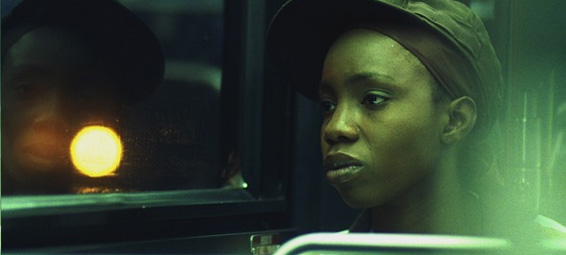There are plenty of pariahs in Dee Rees’ debut feature film: over-worked, under-loved mothers; affectionate, if adulterous fathers; despondent drop outs. But the pariah at the center of Rees’ lonely Brooklyn tale is Alike (Adepero Oduye), a seventeen year old lesbian who hides her sexuality at home and transforms into a tank top-wearing, baseball cap-toting poet in the school bathroom. While the rest of Pariah’s characters have settled into their respective – and expected – roles in a neighborhood and culture where homosexuality is still very much taboo, Alike floats between them all, never quite at home and never quite playing herself.
The success of Rees’ film has everything to do with its carefully orchestrated cinematography and soundtrack. Often drenched in a stifling red, Pariah’s scenes are shot in puddle-shallow focus, placing the camera’s subject – most often Alika – against a blur of settings and secondary characters. It creates the feeling that the world is closing in, and Alika becomes a girl in a bubble. The soundtrack further accentuates the isolation. One of Rees’ strongest strokes is its blaring opening, the vivid, pornographic lyrics of Khia’s “My Neck, My Back” pumping against the frenetic excitement of a lesbian dance club Alike frequents with her more gregarious and sexually confident friend, Laura (Pernell Walker). After the long scene, when Laura leaves Alike alone on the bus at the end of the night, we hear the seventeen-year-old’s music, the soulfully rendering songs of singers like Sparlha Swa.
The juxtaposition of the hyper-sexed world of the gay club with the sensitive, removed, and shy emotional wanderings of Alike’s temperament forms one of the dualities that leaves Alike adrift. There’s also her mother’s unquestionable love which plays against her creeping anxiety about her daughter’s suspected lesbianism. Then there is Alike’s father, warm and affectionate, but ever more distant to his wife, the strain of their splintering marriage trickling down and complicating the lives of their children. How will Alike survive or escape, or does someone like Alike forever float apart?
Relief comes in spurts. She is a poet, a good student, and a music lover. Alike does find a friend who runs at her own speed, Bina (Aasha Davis), whom her mom introduces to her after church, much to the teenager’s dismay. Bina turns out to like similar music, and she is cute and flirty. It then becomes clear that Bina may be entertaining female romance, but one girl’s daring experiment runs against the other’s struggling sense of self and desperate desire for companionship.
Pariah thrives on its small, realist moments, little familial vignettes or dialogue exchanges that capture authenticity in their emotional characterization. Odd then, that these little moments are also sometimes the movie’s largest stumbling blocks. Take two scenes, one where Alike plays basketball with her father, the two reverting to childhood pals, affectionate and playful, and another, in which Alike’s mother shows her coworkers a girlish sweater she bought for her daughter. The former scene deepens and rounds Rees’ characters by merely presenting them to us candidly, while the later scene plays out deliberately, with a forced sincerity hampered by weak dialogue that feels too much like an explanation.
But the essential yearning in Pariah remains uncompromised, to a large extent thanks to Adepero Oduye’s endearing performance. And it is Rees’ deep understanding and empathy for her setting – from the high school hallways to the men’s club bantering – that lend the film its unique sense of place. When relief comes for Alike, it is a very regular kind of solution for a world that has, through the course of Pariah’s nearly ninety minutes, become an impossible emotional complication. The escape route might also seem like a let down, but that it does only underscores the many complexities Rees manages to force to the surface in her feeling treatment of a very normal, if hidden life.






